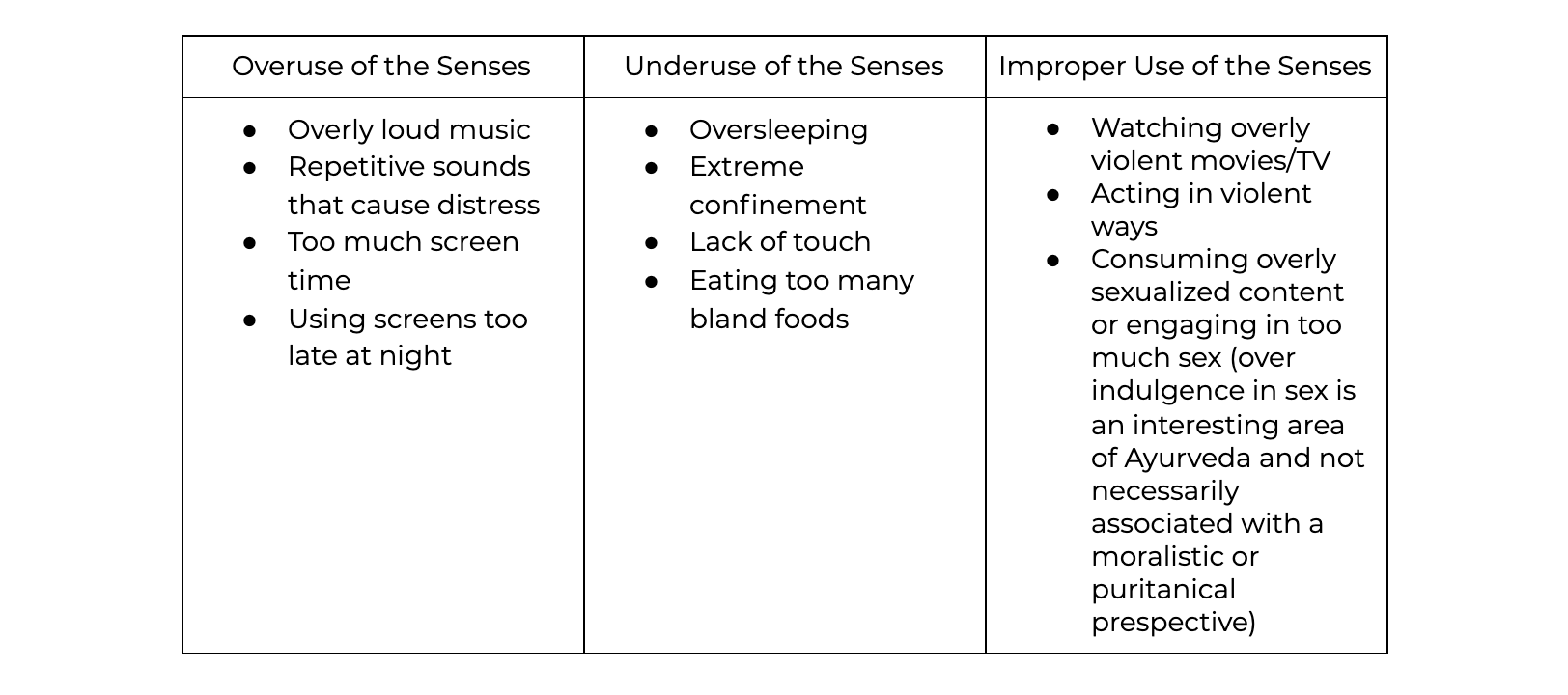Ayurveda + The Senses
Why The Senses Are the Root of Health
The health of the senses is an important part of Yoga and Ayurveda. All that we take in through our sense organs must be digested just like food. We often make the connection of “digesting” emotions or “processing” an event. It’s not an entirely intellectual pursuit but rather a system-based one.
Our nervous system is not limited to our brain (central nervous system) and the vast network splintering out from the spine to the outer edges of the body (peripheral nervous system). There are clusters of nervous system function in various areas that have wide effects systemically.
One such cluster is the network in our stomach and gut, known as the enteric nervous system (ENS). Ayurveda established thousands of years ago that the health of the gut gave rise to health in the rest of the system. With the inverse also being true. That an unhealthy gut equals an unhealthy system. Our diet plays a huge role in our mental health, an area that is being studied more and more by western science.
Maintaining Healthy Senses
Putting aside the effects of diet for a moment, sensory stimuli are brought in from various points in the body and in turn have an effect on the system. Through the various neural networks in the body, we see a range of effects trickle down.
So what are unhealthy sensory stimuli and how do we deal with them? Here is a breakdown according to Ayurveda on how various uses of the senses:
When there is overuse we may see an increase in anxiety, insomnia, and variable digestion. When we see underuse of the senses we may find the slowing down of the functions, the mind, and a dulling of the emotions. When there is improper use, agitation and aggression may increase. These are generalizations but we can start to think about how we get “wired” when we stay up and watch too much TV or that sluggishness that happens when we sleep in too late.
By keeping the senses stable and steady, we can have the best long-reaching effect on the mind and physical functions.
The Importance of Awareness
We need to develop awareness in order to maintain healthy sensory inputs and keep our nervous systems from unnecessarily overworking. Cultivating awareness allows us to discriminate on what, who, how/much, and when we expose ourselves to sensory stimuli.
Obviously, we cannot control everything that enters our field of awareness. But once we understand the degree to which everything has an impact on our senses we can then make more conscious decisions.
That is where the practice of meditation comes in. Practicing meditation and mindfulness builds awareness and can help create space around habitual reactions and impulses so we can really hear what our body, heart, and spirit are telling us (“maybe I don’t need to have that drink” “I know I’ll feel so much better if I move my body right now”). Further, it bolsters our ability to regulate our thoughts, nervous systems, and emotions, when new, and sometimes overwhelming, experiences come our way.
If we’re able to make conscious choices about what we’re doing at the moment, rather than perpetually reacting, we find we have so many more choices as to what the outcome of the situation may be.
Let’s look, for a moment, at the biochemical activities that meditation, mindfulness, and breathing exercises (pranayama) produce. It has been well-studied that these techniques increase the parasympathetic response (the calming, rest, and digest response) and decrease the sympathetic response (stress, fight, and flight). Meaning that our active engagement with mindfulness, meditation, and breathing exercises allows us more opportunity to prevent the harmful cascade of effects from stress (high blood pressure, digestive upset, anxiety, insomnia, muscle tension, etc).
Practice Makes…
NOT perfect! This is a common roadblock for many wanting to try mindfulness practices. Folks think that they need to have a clear mind to meditate. Actually quite the opposite is true: the mind quiets down through the practice of meditation.
So practice is key but there is no perfectionism here. It’s about showing up and becoming aware. Practicing the techniques when things are calm will set you up for success when practicing them under duress. The more you practice, the sooner you can see trouble brewing when it comes to sensory overload and the better chance there is of managing it both before and when things become overwhelming.
So find a class, an app, or a teacher to help guide you. Yoga and Ayurveda are not one-size-fits-all practices so working one-on-one is the most beneficial because different people require different practices. Knowing, and using, these tools keep the senses healthy and maintain a resilient mind, body, and soul.



